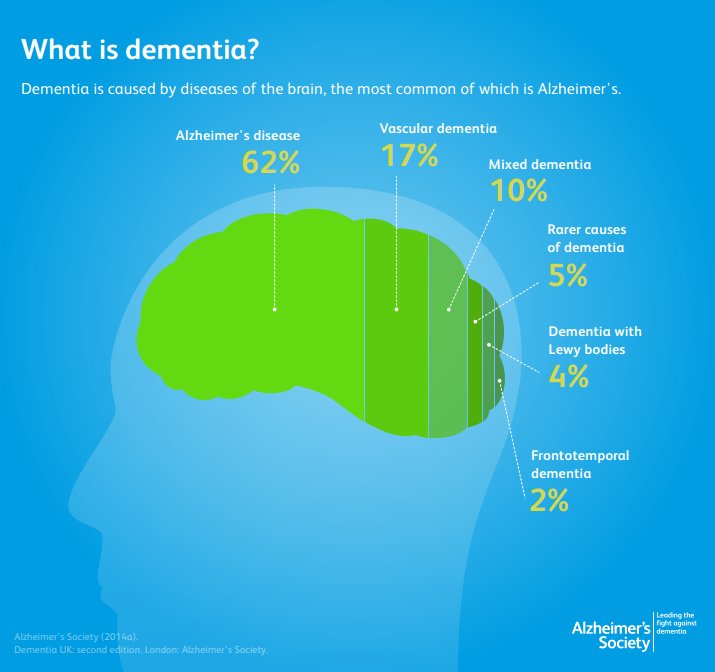5 things you should know
about dementia
Five things you should know about dementia
1. Dementia is not a natural part of ageing
Dementia doesn’t affect only older people. There are over 40,000 cases in the UK of people with early-onset dementia – before the age of 65. Memory loss is only one symptom that affects people with dementia. Others can include difficulties with planning, thinking things through, struggling to keep up with a conversation, and sometimes changes in mood or behaviour. If you’re worried about your memory, or about someone else, the first thing to do is make an appointment with the GP.
2. Dementia is caused by diseases of the brain
Different types of dementia affect different parts of the brain. Some types of dementia are – vascular dementia, mixed (Alzheimer’s disease and vascular) dementia with Lewy bodies, frontotemporal dementia.
Everyone experiences dementia in their own way. Lots of things can affect this, including the person’s attitude to their diagnosis and their physical health. Other factors include the relationships they have with friends and family, the treatment and support they get, and their surroundings.
3. It's not just about losing your memory
Dementia often starts by affecting the short-term memory. However, other symptoms may be prevalent too, such as:
- difficulties concentrating
- problems planning and thinking things through
- struggling with familiar daily tasks, like following a recipe or using a bank card
- issues with language and communication, for example trouble remembering the right word or keeping up with a conversation
- problems judging distances (even though eyesight is fine)
- mood changes and difficulties controlling emotions. For example, someone might get unusually sad, frightened, angry, easily upset, or lose their self-confidence and become withdrawn.
4. People can still live well with dementia
Although there is no cure for dementia, scientists and researchers are working hard to find one. However, there is existing support and treatments that can help people lead active and purposeful lives.
Examples of things that can help with symptoms of dementia:
- cognitive stimulation, which might involve doing word puzzles or discussing current affairs
- life story work, sharing memories and experiences with a carer or nurse to create a ‘life story book’
- keeping as active as possible – physically, mentally and socially – which can boost memory and self esteem, and help avoid depression.

5. There is a lot of existing support for people and families affected by dementia:
- Alzheimer’s Society provide a National Dementia Helpline – on 0300 222 11 22 if you’d like to talk to someone for information, support or advice.
- Or sign up to Talking Point, their online community for anyone affected by dementia. Available 24 hours a day, seven days a week (https://www.alzheimers.org.uk/get-support/talking-point-our-online-community) .
- Dementia UK provide an Admiral Nurse Dementia Helpline on 0800 888 6678 (or email helpline@dementiauk.org) for anyone with a question or concern about dementia.
- Source: https://www.alzheimers.org.uk/about-dementia/five-things-you-should-know-about-dementia.


